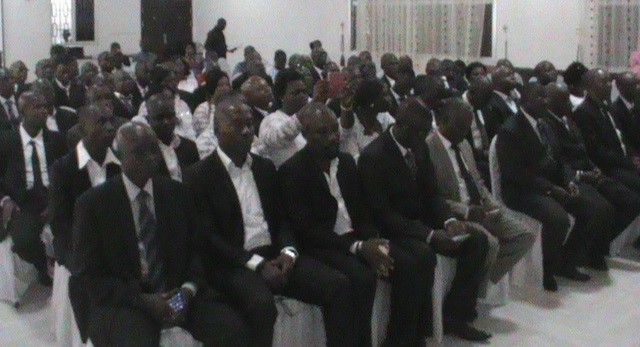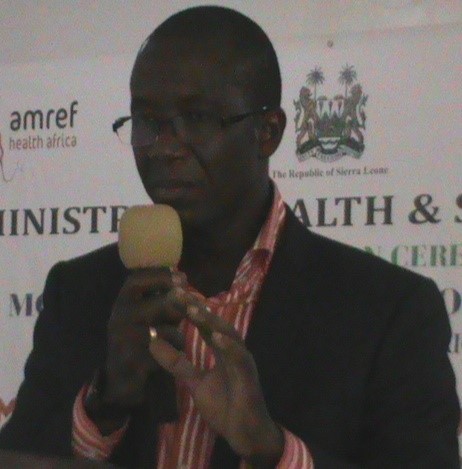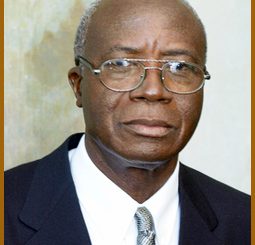
By Jonathan Abass Kamara
Health and Sanitation Minister, Dr. Abu Bakarr Fofanah has described 60 newly trained Monitoring and Evaluation Officers as the Police men of the Ministry at their graduation ceremony held on Saturday October 1, 2016 at the Wusum Hotel in Makeni.
Health and Sanitation Minister, Dr. Abu Bakarr Fofanah
The training and course objectives among others aimed at enabling Monitoring and Evaluation Officers to be able to describe concepts, principles, processes relevant to monitoring and evaluation of development programmes, as well as applying relevant tools for programme planning. The training was jointly organized by the African Medical and Research Foundation (AMREF) health Africa with support from the World Bank and UNICEF.
Cross section of graduands
Delivering his keynote address, the Health and Sanitation Minister, Dr. Abu Bakarr Fofanah described the occasion as historic and recalled the last Sector Performance Review at Sierra Light House in Freetown where he noted that one of the challenges highlighted was the bench mark of activities implemented by implementing partners.
He observed that every single implementing partner is an expert in maternal and child health with the deciding factors being where the resources or money should be used, pointing out that monitoring and data is crucial to the activities of all implementing partners.
The need for accurate, reliable and credible data to make the difference on the mode of engagement to show case the Ministry’s priority devoid of duplication of efforts by implementing partners, the Minister said would aid effectiveness on health intervention not realized in the past.
Dilating on the introduction of the Service Level Agreement (SLA), Dr. Fofanah underscored the importance of the SLA towards national development, noting the misconception and selfish interest of some NGOs and partners who failed to understand that the SLA is a tool design to give tips to the implementing partners for stronger and resourceful coordination of activities in their various areas of operation. The need of engagement to know where partners operate, areas of support, who and what resources provided prior to the SLA have not in the past meaningful to the Ministry, communities and the government, adding that the 10-24 months Presidential Priority is now a test case and there is going to be what he referred to as “a rough ride”, during this period.
He maintained that with the District Medical Officers and the Councils as signatories to the SLA, there is the urge for transparency and accountability.
Dr. Fofanah congratulated the graduands on their success, and admonished them to use the knowledge gained for the furtherance of development, timeliness, quality and accurate completeness of their report, adding that recruitment into the civil service for Monitoring Officers not on government payroll would be given its due attention and consideration.
Giving the Training Report, the Acting Planning Specialist, Directorate of Planning, Policy and Information, Mr. Alhassan Fouard Kanu said participants by the end of the course should be able to apply relevant tools for programme planning, design and develop a monitoring and evaluation system for a project, formulate result-oriented indicators for change monitoring, apply tools for qualitative and quantitative data analysis and be able to write and disseminate accurate and credible reports.
On the course deliverables, Mr. Kanu opined that in collaboration with AMREF Healthb Africa, facilitators from the Ministry of Health and Sanitation Directorate of Planning, Policy and Information and AMREF Health Africa were predominantly able to deliver adult learning methods with occasional lecturing to introduce new concepts and materials, adding that hands on was also encouraged throughout the training of each of the cohorts of Monitoring and Evaluation Officers during the four weeks training.
In his address, the Regional Training Manager, Directorate of Capacity Building, Short Courses Unit, Amref Health Africa Headquarter, Nairobi, Kenya, Mr. Francis Namisi said they operate seven offices within the Africa region and has conducted training for the last 50 years.
He congratulated the Ministry of Health for being the first country to train 60 personnel in one government Ministry, and encouraged the newly trained officers to work on the data and translated it to get the necessary result.
Mr. Namisi told his audience that report wrongly or negatively produce is disastrous and a dis-service to the nation. He said the basis is to report on result rather than activities.
The Regional Training Manager said they have both long and short term programmes, partnering with other universities for long term programmes and currently heading for a Pan African University.
Amref Health Africa is Winner of the Gates Award Bill and Melinda Gate Foundation for Global Health.
The Director, Planning, Policy and Information, Ministry of Health and Sanitation, Dr. Samuel Kargbo described the training as a journey for progress to improve service delivery, and a vision for an improved Health Management Information System. He reiterated that it is a journey looking at the height of hope in building a resilient health system for Sierra Leone.
Dr. Kargbo noted that to strengthen the Ministry’s infrastructure there is the need to manage a proper data system by expanding their infrastructure, and examine the available system to achieve the desired goal.
He observed that organizations and NGOs came up with their own data, describing the move as unacceptable, noting that they need only one system for all dealing with data within the Ministry’s system.
Dr. Kargbo disclosed that plans are currently underway for continuity with the training in partnership with the College of Medicine and Allied Health Sciences (COMAHS) to produce what he referred to as Health Monitoring and Evaluation Officers that would be permanent staff of the Ministry of Health and Sanitation.
Making his remarks, the UNICEF Representative, Geoff Wiffin advocated for the allocation of more resources to the Ministry of Health for child immunization and maternal health, adding that with the efforts seen by the Ministry, he is optimistic that progress on the 10-24 months Presidential Recovery Priority would make the difference.
He said data is crucial to show evidence and reiterated UNICEF’s continued support to the Ministry, the government and people of Sierra Leone.
Other highlights include statement from the Chairman Parliamentary Committee on Health, Dr. Abdulai Sesay and distribution of certificates to recipients which climaxed the occasion. PHOTO: Credit Kadrie Koroma




